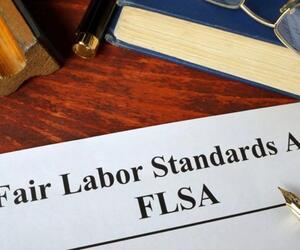Fair Labor Standards Act
What is it
The Fair Labor Standards Act (FLSA) is Federal law, dating back over half a century, that establishes certain minimum standards for wages, premium overtime, and other employment conditions. The FLSA did not apply to the University (i.e., we were not a "covered employer") until 1967 when amendments extended coverage to various government-related agencies. That coverage lasted only a few years before the Supreme Court decision voided the amendments. The coverage was finally re-established in 1985 through another Supreme Court decision and Congressional action.
FLSA Coverage
|
|
The FLSA regulates whether an employee is overtime-eligible ("non-exempt") or overtime-exempt ("exempt"). One of the requirements of the FLSA is for an employer to determine the exemption status of each employee. Beginning December 1, 2016, to qualify for FLSA exempt status, the FLSA rule requires that an employee earn no less than $913 per week, or $47,476 per year.
Resources
When Changing FLSA Status
Because hourly non-exempt staff are paid on bi-weekly basis, and salary exempt staff are paid on a monthly basis, a change of FLSA status means a change in pay cycles. The following resources have been prepared to assist employees during this transition. A one-week gap in income is not uncommon due to the payroll processing times for the different pay cycles.
Exempt Employees
Exempt employees are not covered by (or are “exempt” from) the FLSA’s regulations pertaining to overtime. Four major exemption categories have been established and defined by the Act. They are "executive," "administrative," "professional" and “outside sales.” To be determined exempt under one of these categories, the employee’s position must meet certain criteria relating to their job responsibilities.
Exempt employees are:
- Paid an established monthly (or annual) salary.
- Paid for carrying out the duties of their position – regardless of how many hours worked.
- Exempt employees may work more or less than 40 hours per week and their pay does not change.
- They do not receive overtime nor compensatory time off.
Non-Exempt Employees
Non-exempt employees are covered by the minimum wage and overtime provisions of the FLSA and are required to account for time worked as well as use of sick, vacation, and other leave time to the nearest one-quarter hour. The FLSA requires that these employees be compensated for qualified overtime hours at the premium (time-and-one-half) rate.
